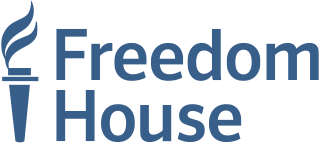
Telecommunications in Cambodia include telephone, radio, television, and Internet services, which are regulated by the Ministry of Posts and Telecommunications. Transport and posts were restored throughout most of the country in the early 1980s during the People's Republic of Kampuchea regime after being disrupted under Democratic Kampuchea.

Totalitarianism is a political system and a form of government that prohibits opposition political parties, disregards and outlaws the political claims of individual and group opposition to the state, and controls the public sphere and the private sphere of society. In the field of political science, totalitarianism is the extreme form of authoritarianism, wherein all socio-political power is held by a dictator, who also controls the national politics and the peoples of the nation with continual propaganda campaigns that are broadcast by state-controlled and by friendly private mass communications media.

Freedom House is a non-profit organization based in Washington, D.C. It is best known for political advocacy surrounding issues of democracy, political freedom, and human rights. Freedom House was founded in October 1941, with Wendell Willkie and Eleanor Roosevelt serving as its first honorary chairpersons. Most of the organization's funding comes from the U.S. State Department and other government grants. It also receives funds from various semi-public and private foundations, as well as individual contributions.
Freedom of the press or freedom of the media is the fundamental principle that communication and expression through various media, including printed and electronic media, especially published materials, should be considered a right to be exercised freely. Such freedom implies the absence of interference from an overreaching state; its preservation may be sought through the constitution or other legal protection and security. It is in opposition to paid press, where communities, police organizations, and governments are paid for their copyrights.

Crypto-anarchy, crypto-anarchism, cyberanarchy or cyberanarchism is a political ideology focusing on the protection of privacy, political freedom, and economic freedom, the adherents of which use cryptographic software for confidentiality and security while sending and receiving information over computer networks. In his 1988 "Crypto Anarchist Manifesto", Timothy C. May introduced the basic principles of crypto-anarchism, encrypted exchanges ensuring total anonymity, total freedom of speech, and total freedom to trade. In 1992, he read the text at the founding meeting of the cypherpunk movement. Most Crypto-anarchists are anarcho-capitalists but some are anarcho-mutualists.

Mass surveillance is the intricate surveillance of an entire or a substantial fraction of a population in order to monitor that group of citizens. The surveillance is often carried out by local and federal governments or governmental organizations, but it may also be carried out by corporations. Depending on each nation's laws and judicial systems, the legality of and the permission required to engage in mass surveillance varies. It is the single most indicative distinguishing trait of totalitarian regimes. It is often distinguished from targeted surveillance.
The System for Operative Investigative Activities is the technical specification for lawful interception interfaces of telecommunications and telephone networks operating in Russia. The current form of the specification enables the targeted surveillance of both telephone and Internet communications. Initially implemented in 1995 to allow access to surveillance data for the FSB, in subsequent years the access has been widened to other law enforcement agencies.
The Internet is accessible to the majority of the population in Egypt, whether via smartphones, internet cafes, or home connections. Broadband Internet access via VDSL is widely available. Under the rule of Hosni Mubarak, Internet censorship and surveillance were severe, culminating in a total shutdown of the Internet in Egypt during the 2011 Revolution. Although Internet access was restored following Mubarak's order, government censorship and surveillance have increased since the 2013 coup d'état, leading the NGO Freedom House to downgrade Egypt's Internet freedom from "partly free" in 2011 to "not free" in 2015, which it has retained in subsequent reports including the most recent in 2021. The el-Sisi regime has ramped up online censorship in Egypt. The regime heavily censors online news websites, which has prompted the closure of many independent news outlets in Egypt.

Thailand's connection to the Internet began in 1987 via the Australian Research and Edcuation Network using UUCP and SUNIII which transformed to full TCP/IP in 1992 to UUNET. This marked Thailand as an early participant in bringing the Internet to Asia.
The Internet in Kazakhstan is growing rapidly. Between 2001 and 2005, the number of Internet users increased from 200,000 to 1 million. By 2007, Kazakhstan reported Internet penetration levels of 8.5 percent, rising to 12.4 percent in 2008 and 34.3% in 2010. By 2013, Kazakhstani officials reported Internet penetration levels of 62.2 percent, with about 10 million users. There are five first-tier ISPs with international Internet connections and approximately 100 second-tier ISPs that are purchasing Internet traffic from the first-tier ISPs. As of 2019, more than 75% of Kazakhstan's population have access to the internet, a figure well ahead of any other country in Central Asia. The Internet consumption in the country rose from 356 PB in 2018 to 1,000 PB in 2022.
Authoritarianism is a political system characterized by the rejection of democracy, and political plurality. It involves the use of strong central power to preserve the political status quo, and reductions in the rule of law, separation of powers, and democratic voting. Political scientists have created many typologies describing variations of authoritarian forms of government. Authoritarian regimes may be either autocratic or oligarchic and may be based upon the rule of a party or the military. States that have a blurred boundary between democracy and authoritarianism have some times been characterized as "hybrid democracies", "hybrid regimes" or "competitive authoritarian" states.

Internet censorship in South Korea is prevalent, and contains some unique elements such as the blocking of pro-North Korea websites, and to a lesser extent, Japanese websites, which led to it being categorized as "pervasive" in the conflict/security area by OpenNet Initiative. South Korea is also one of the few developed countries where pornography is largely illegal, with the exception of social media websites which are a common source of legal pornography in the country. Any and all material deemed "harmful" or subversive by the state is censored. The country also has a "cyber defamation law", which allow the police to crack down on comments deemed "hateful" without any reports from victims, with citizens being sentenced for such offenses.

In Russia, internet censorship is enforced on the basis of several laws and through several mechanisms. Since 2012, Russia maintains a centralized internet blacklist maintained by the Federal Service for Supervision of Communications, Information Technology and Mass Media (Roskomnadzor).

Mass surveillance is the pervasive surveillance of an entire or a substantial fraction of a population. Mass surveillance in India includes Surveillance, Telephone tapping, Open-source intelligence, Lawful interception, and surveillance under Indian Telegraph Act, 1885.

Mass surveillance in the People's Republic of China (PRC) is the network of monitoring systems used by the Chinese central government to monitor Chinese citizens. It is primarily conducted through the government, although corporate surveillance in connection with the Chinese government has been reported to occur. China monitors its citizens through Internet surveillance, camera surveillance, and through other digital technologies. It has become increasingly widespread and grown in sophistication under General Secretary of the Chinese Communist Party (CCP) Xi Jinping's administration.

In internet governance, network sovereignty, also called digital sovereignty or cyber sovereignty, is the effort of a governing entity, such as a state, to create boundaries on a network and then exert a form of control, often in the form of law enforcement over such boundaries.
Mass surveillance is the pervasive surveillance of an entire or a substantial fraction of a population. Mass surveillance in Russia includes surveillance, open-source intelligence and data mining, lawful interception as well as telecommunications data retention.
Government by algorithm is an alternative form of government or social ordering where the usage of computer algorithms is applied to regulations, law enforcement, and generally any aspect of everyday life such as transportation or land registration. The term "government by algorithm" has appeared in academic literature as an alternative for "algorithmic governance" in 2013. A related term, algorithmic regulation, is defined as setting the standard, monitoring and modifying behaviour by means of computational algorithms – automation of judiciary is in its scope. In the context of blockchain, it is also known as blockchain governance.
Mass surveillance in Iran looks into Iranian government surveillance of its citizens.







